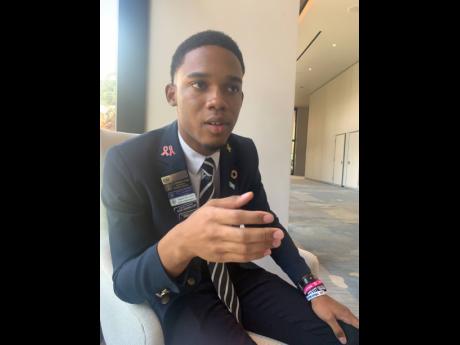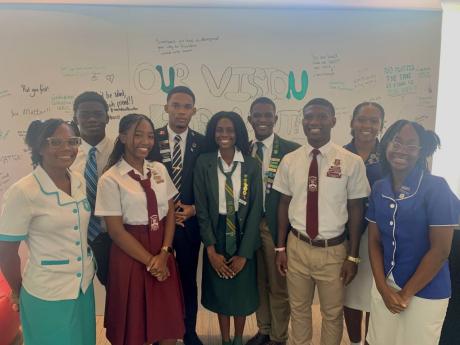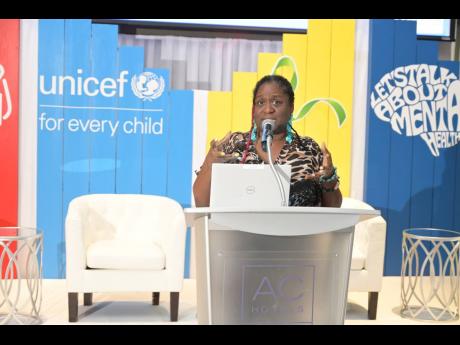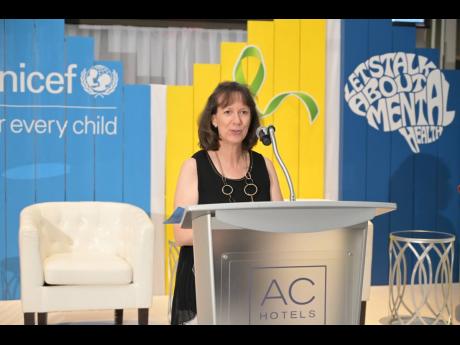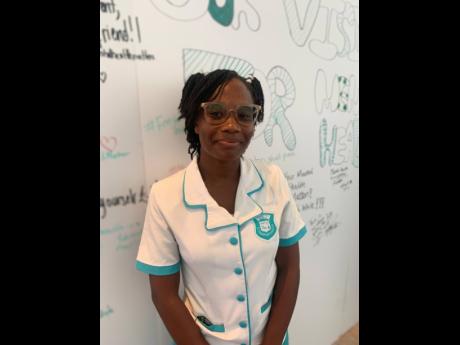Psychologist: Mental health more than meets the eye
Dialogue key to intervention as 1 in 3 J’cans report onset of mental disorders by age 14
A clinical psychologist has expressed concern over a local misconception that mental-health challenges are comparable to physical ailments in that they can be easily identified when looking at a person.
Speaking with The Gleaner at a youth mental health summit organised by UNICEF Jamaica and the Jamaica Youth Advocacy Network on Wednesday, Dr Kai Morgan said that one of the reasons many family members and loved ones have not offered support to adolescents facing mental-health issues is that they believe that they need to witness “that something is significantly wrong” with their own eyes.
“[Because] otherwise, if you are getting up and going to school every day and you getting decent grades and you have your friend dem and whatever, they’re, like, ‘No, you’re fine’,” she explained.
“It’s a huge misconception ... . My view is that it comes from how we see physical health because usually, you can see when somebody’s foot breaks; if they have the flu, you hear them coughing; and things like that, and so, when we don’t see it, it’s, like, ‘Oh, it not there’ because we’re accustomed to doing that in terms of how we see health,” Morgan reasoned.
She said that on the contrary, most of the time, mental-health issues are “hidden” because “if you ever hear what they’re really dealing with, then you would recognise, but it’s something that requires you to be open to listening to people when they talk and not taking them at face value”.
The clinical psychologist said that while some people are not fond of therapy because they perceive a stigma around it, others have tried it. She added that while some persons did not like it and were resistant, after their continued attendance, they developed a change of heart, realising that it helped in managing their mental-health issues.
“One of them actually said that they only saw therapy for serious mental-health issues like trauma, so only when you get to your bottom and on your last is when you have accessed therapy,” she said.
AWARENESS
Others, however, were aware that therapy was also for common issues such as challenges at school or at home.
The two-day hosting of the summit was timed to follow Tuesday’s observation of World Mental Health Day under the theme ‘Mental Health Is a Universal Human Right’.
Morgan presented her study, ‘Child and Adolescent Mental Health in Jamaica: Youth Focus Group Discussions’, which aimed to synthesise available national data on child and adolescent mental health and access to these services; to map critical national laws, policies, and programmes that address the quality of and access to mental health and related services for children and adolescents; and to identify relevant and appropriate advocacy messages and asks around adolescent mental health informed by the analysis of existing gaps and best practices.
Ninety-six adolescents from Kingston, St Andrew, St Ann, and St Mary participated in the nine focus group discussions. The participants, including adolescents living with diabetes from St Thomas and adolescents living with HIV (ALHIV) from St James, were between 13 and 24 years old.
Morgan told The Gleaner that while “the youth have really put the issues on the table in a real way”, there remained a lack of openness about mental health within the home, communities, schools, and the wider society.
While the issues are not new, an alarming number of young people are still pleading for assistance in addressing their mental-health crises, she said. Many indicated that financial constraints, a lack of parental support, and a fear of stigma were some of the reasons they were unable to receive mental-health services in Jamaica, leaving them feeling helpless and alone.
But a significant aspect of mental health is self-awareness and identifying triggers to distressing feelings and negative thought processes, Morgan said.
During her presentation, she highlighted that 20 per cent of Jamaican children have mental-health disorders, which represented approximately 120,000 children. She continued that 63 per cent of Jamaicans with mental disorders report an onset before the age of 25 years and that 35 per cent of Jamaicans with mental disorders report an onset before age 14.
SOCIOCULTURAL FACTORS
The sociocultural factors affecting the youth included ongoing domestic and community violence, extreme poverty, recurrent abuse and neglect, and maternal depression.
Cavan Lewis, president of the National Secondary Students’ Council, told The Gleaner that Wednesday’s events were useful, especially with the opportunity to break into smaller, more intimate groups, where the youth had a safe space to speak about issues affecting their mental health.
He commended the organisers for hosting the inclusive summit, which also had members from the deaf and disabled communities participating.
“My mental-health issues are going to be different from somebody else’s because they are going through different things in their personal lives,” he noted, adding that the various perspectives shared were insightful.
For Shaniel Brooks, student of Denbigh High School in Clarendon, the summit opened her eyes to things she did not know.
“I learnt about the U-Matter and other means and ways about how to deal with mental health and I got more insight on what mental health is,” she explained, referring to an anonymous mental-health chatline for counselling youth.
UNICEF Jamaica representative Olga Isaza said the organisation has partnered with the Ministry of Health and Wellness to define an intersectoral mental-health policy for children and adolescents in Jamaica. This policy, she explained, must be evidence-based and should consider youth voices.
UNICEF Jamaica’s five priority areas:
1. Social Policy
•Existing policies are not specific to child and adolescent mental health needs and issues and neglect the voices of the Jamaican youth.
• Primary prevention warrants more focus in the policy framework.
•Monitoring and evaluation is critical.
•Framework that prioritises efficient intersectoral collaboration.
2. Child Protection
•Capacity building efforts at all tiers of caregivers and service providers is critical.
•Reduction of stigma and infusion of trauma-informed care is needed.
•Importance of including adolescent and youth voices across research, advocacy, interventions and training efforts.
•Liaison with governmental ministries to advance these efforts for specific groups of vulnerable youth [e.g. children in conflict with the law & in correctional institutions [Ministry of National Security & Ministry of Justice].
3. Education
•Recommendations regarding protection of vulnerable youth include the creation of safe learning environments and overall better access to education.
4. Survive and Thrive
•Issues such as nutritional practices, physical activity and quality of health cannot be separated from psychosocial wellness.
5. Climate Change and Resilience
•There is a need for greater awareness and understanding of the relationship between climate change and psychological well-being.
•Building resilience in youth to be their own advocates and to manage their own psychosocial health is an important part of the framework.

